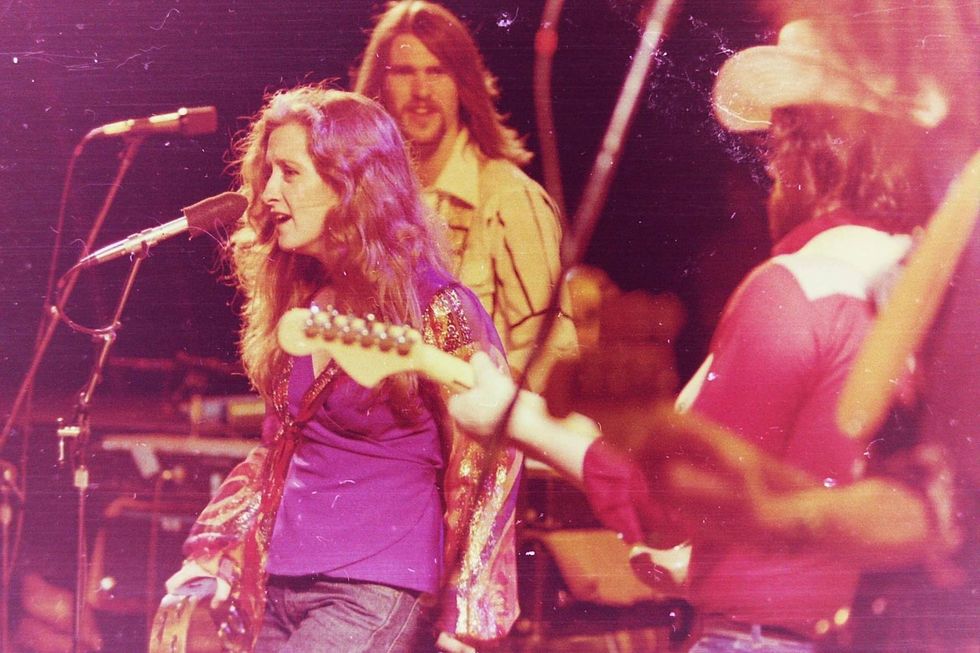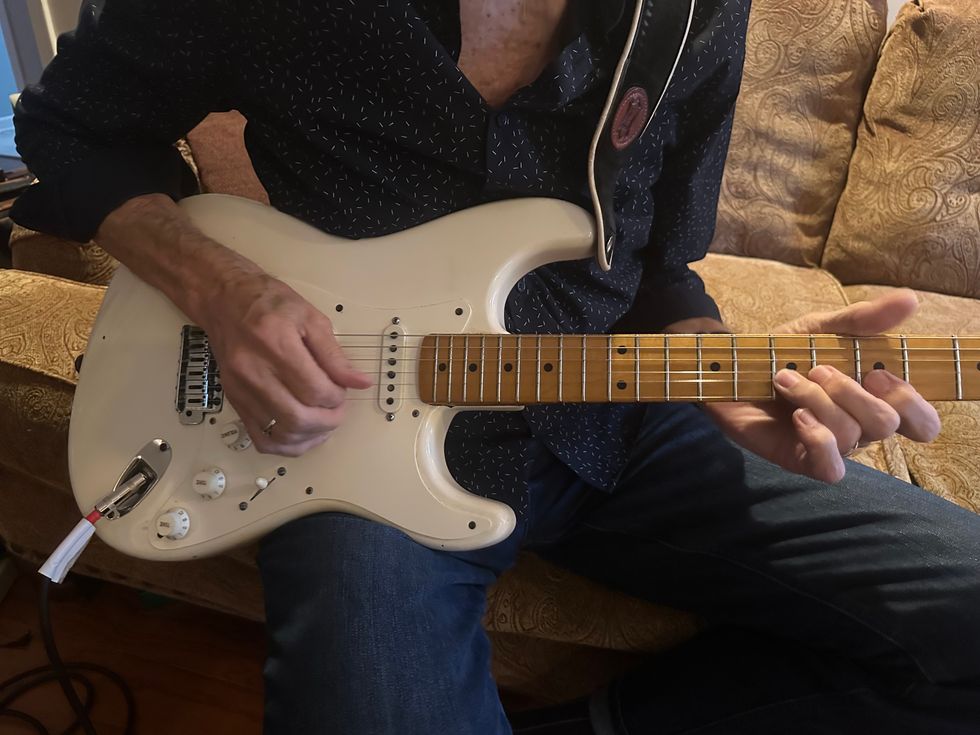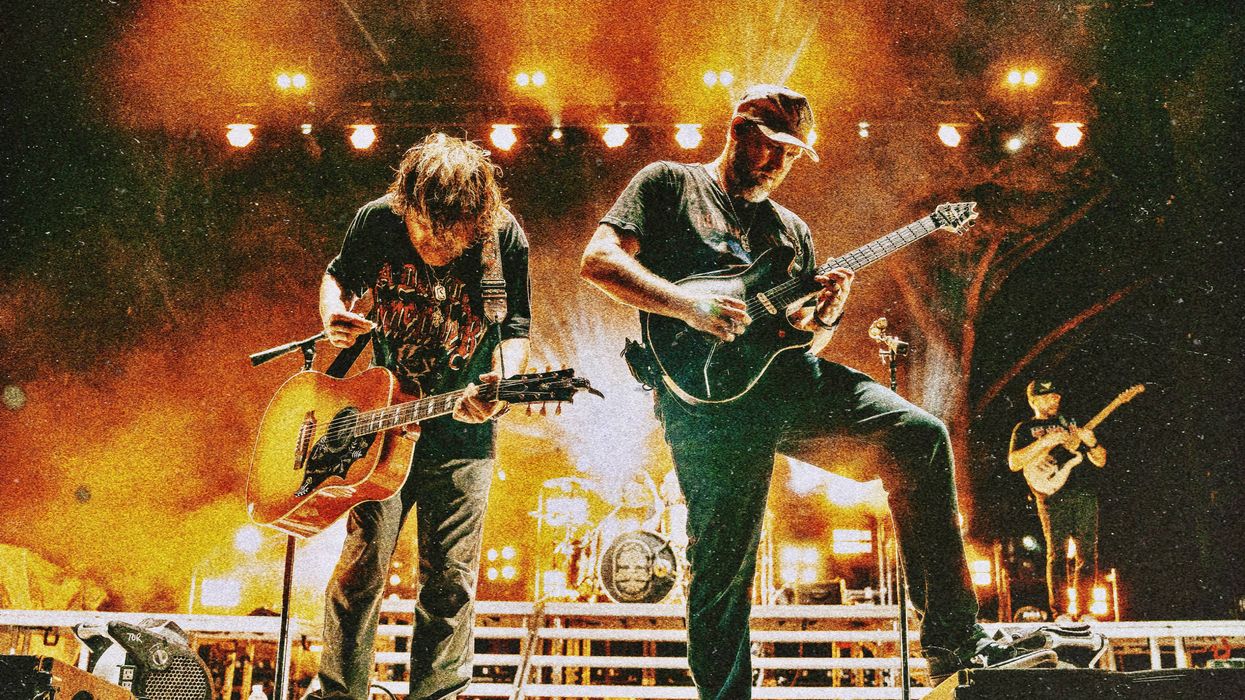You know that feeling you get when you find a hundred-dollar bill on the ground? That jolt of joy that makes a bad day better and a good day even more awesome? That’s the feeling I get when I hear the new Black Keys album, Ohio Players. Except, in some ways it’s more like stumbling on a diamond.
There are so many facets and reflections, so many angles beaming influences and ideas … and it’s clearly the product of time—a work Dan Auerbach and Patrick Carney say they could not have completed earlier in their partnership, although there has been lots of groundwork along the way.
“It’s amazing to be 20 years into our career and have a new trick to be able to do, which is collaboration,” says Auerbach, when asked about the sprawl of styles and the roster of mighty contributors—including Noel Gallagher and Beck—on Ohio Players. “That’s kind of the key to most people’s success throughout musical history, but we’ve shied away from it, extremely. Now, it’s lit a fire under our asses, and the possibilities feel endless.
“Pat and I are at the point in our careers where we feel like letting other people into our space. We never used to be.”—Dan Auerbach
“We were just too insecure back in there,” he continues. “But now we’ve produced enough records, we’ve worked with enough people, so it’s really fun for us. Pat and I are at the point in our careers where we feel like letting other people into our space. We never used to be. And at the same time, our own relationship is tighter than it’s ever been.”
The Black Keys - Beautiful People (Stay High) ("Official" Video)
Revisiting the Black Keys’ first two albums, The Big Come Up and Thickfreakness, it’s hard to imagine they would become an international juggernaut and that Auerbach, their singer and guitarist, would evolve into one of the most interesting players, producers, and songwriters in modern American music. After all, the duo’s initial recordings were raw as uncooked bacon—recorded in a basement in Akron, Ohio, with mics bought on eBay—and their repertoire bridged garage rock and a style, cultivated by North Mississippi hill country rural bluesmen Junior Kimbrough and R.L. Burnside, that’s so rough and thunderous that even some hardcore fans of that genre had difficulty comprehending it.
But Auerbach and Carney’s intelligence, empathy, and history as collaborators might be more apparent to their fans than it seemingly was, at least until this album got underway a few years ago, to them. Starting with 2008’s Attack & Release, they’ve worked with Danger Mouse as a producer and co-writer; Mos Def, Ludacris, Q-Tip, Ol’ Dirty Bastard, RZA, and other hip-hop luminaries on their 2009 Blakroc album; North Mississippi firebrands Kenny Brown and Eric Deaton on 2021’s blues payback Delta Kream; even Billy Gibbons and Sierra Ferrell on 2022’s raucous Dropout Boogie. And Auerbach’s co-op rock band, the Arcs, recorded two acclaimed albums and toured the world, while his second solo recording, 2017’s Waiting on a Song, was a spelunk into the heart of his adopted hometown Nashville’s studio history, drawing on a cross-generational cast of legendary session players. Then, there’s the guitarist’s football-field-long production credits, ranging from the Black Diamond Heavies to Dr. John and Grace Potter to La Luz to CeeLo Green to Marcus King to Hermanos Guitiérrez to Robert Finley and Yola.
“We got to this maturity as a band where not only can we call these friends, but we can deliver music our idols want to play on.”—Pat Carney
Sometimes, when you’re in the forest, all you can see are the trees. But now, after all that experience, the Black Keys’ omnivorous tastes, ceaseless drive, and undeniable success tilted their creative compass and comfort zone to Ohio Players, which might be poetically described as an album of peace, soul, and thunder. Also, eclectic and skillful af. Here, Auerbach and his drumming buddy have evolved what sounds like a mastery of every genre they’ve chosen to assimilate over the years: blues, jazz, country, classic pop, rock in its old and new variants, soul, hip-hop … even ambient music. Spend 20 minutes listening to the anthemic chords of “On the Game,” a co-write with Noel Gallagher; the fuzz fests “Paper Crown” and “Everytime You Leave,” the latter co-written with Beck; the psychedelic hip-hop-pop of “Candy and Her Friends;” and the period-perfect reworking of William Bell’s 1968 Stax hit “Forgot to Be Your Lover,” and you’ll get lost in the vibe—a happy time traveler through roots-informed music’s past and present.
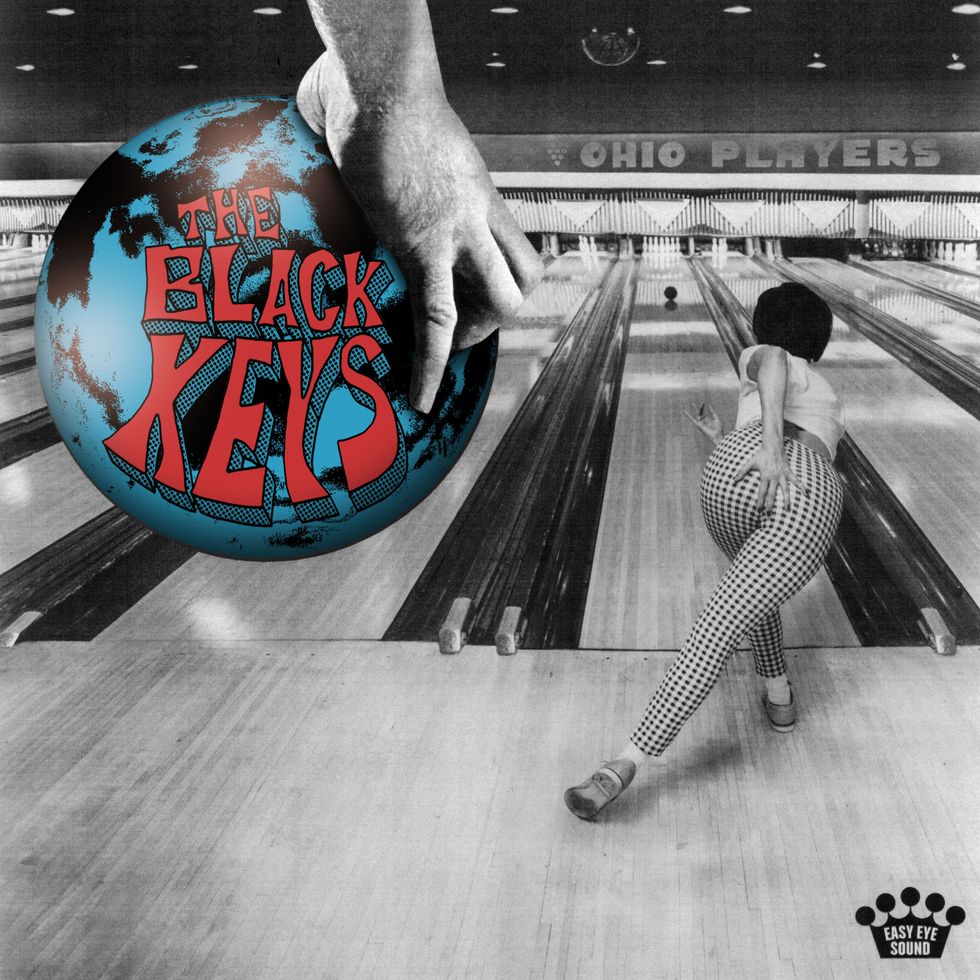
The band’s new release was made at the same time as they were creating their last few albums, with Dan Auerbach and Pat Carney collecting the results of their collaboration wish list.
The album’s other spark plugs include hip-hop-beat brainiac and producer Dan the Automator; Memphis rap legends Juicy J (of Three 6 Mafia) and Lil Noid; producer/guitarist Angelo Petraglia, who’s made records with Kings of Leon and many others; and Nashville session hero Tom Bukovac, a truly estimable guitarist.
Of course, the biggest surprise is Gallagher, who co-wrote three rockers for Ohio Players, lending his patently anthemic touch. As it turns out, Gallagher is a big Black Keys fan, and in 2009, the duo were invited to open for his former band, Oasis. “But we were busy,” Carney says, “and they broke up.”
Despite a four-year hiatus from 2015 to 2019, the Black Keys stayed busy—even separately, during that break. They resumed making Black Keys albums in 2018, with ‘Let’s Rock’, and while they were creating its two successive releases, Auerbach and Carney also launched the series of collaborations that yielded Ohio Players.
“We had this epiphany—we can call our friends to help us make music,” Carney says. “It’s funny because we both write songs with other people, but we got to this maturity as a band where not only can we call these friends, but we can deliver music our idols want to play on.”“Noel Gallagher was feeling inspired because he hadn’t recorded like that. It’s not really common to have zero baffles between the vocals and the drums.”—Dan Auerbach
The first call was to Beck—a major influence on Auerbach and Carney when they were growing up in Akron. “His aesthetic was incredible,” Auerbach says. “He wore his influences on his sleeve, and we learned from that. There was someone showing us a way to go.” Beck was also an early Black Keys fan, and took them on tour in 2003. He is on half of Ohio Players’ 14 tracks as a writer, vocalist, guitarist, and keys player.“
After we’d gotten Beck in the studio, we were throwing names back and forth—‘Who else would be meaningful and write big songs we like?,’” says Auerbach. “Noel was at the top of the list.” The Keys’ manager, and even Gallagher’s team, when initially approached, responded that the former Oasis co-leader simply doesn’t co-write. “But we got a message back a few days later that said he’d be down if we came to London. We didn’t know if it was going to work, but after we recorded one song the first day, it took all our nervousness away.” By the end of a week, they had three numbers for Ohio Players.
Dan Auerbach's Gear

Dan Auerbach plays one of his original Supros in concert in 2023. He has a collection of vintage guitars, including instruments owned by Hound Dog Taylor and Mississippi Fred McDowell.
Photo by Jordi Vidal
Guitars
- 1960 Fender Telecaster Deluxe
- 1965 Teisco Del Rey ET-300
- Gibson J-45
- Danelectro Vincent Bell Signature Coral Firefly
Amp
- 1950s narrow-panel tweed Deluxe
Effects
- Analog Man Sun Face
- Marshall SupaFuzz
- Fulltone Octafuzz
- Vintage flanger
- Strymon El Capistan
- Xotic RC Booster
- Custom fuzz (gift from Pat Carney)
Picks, Strings, & Slides
- National metal finger pick
- Custom picks
- SIT .011 sets
- Brass slide
“That was amazing on a lot of levels,” Auerbach continues. “It was fun as hell. We’d really wanted to go to Toe Rag Studios in London and record there. Toe Rag is such an amazing studio. It’s one room, no vocal booths or anything like that—smaller than a single-car garage. [The all-analog space is where Wolf Alice, Tame Impala, the Kills, James Hunter, Hugh Cornwell, and many others have recorded.] Pat’s got a drum kit, I’m on guitar, and Noel’s playing his ES-335 most of the time, with Leon Michaels on this weird little German ’60s keyboard, and [engineer] Liam Watson behind the old, beautiful desk.”
After the sessions, Auerbach and Carney dubbed Gallagher “the chord lord.” “He would sit there and cycle through chords until he found that one that worked with mine,” Auerbach recounts. The songs they cut, “On the Game,” “Only Love Matters,” and “You’ll Pay,” were essentially recorded live, with additions—like Bukovac’s guitar—done at Auerbach’s Easy Eye Sound studio in Nashville. “Every time we listened to a playback, it sounded so good that it was inspiring, and Noel was feeling inspired because he hadn’t recorded like that before. It’s not really common to have zero baffles between the vocals and the drums. We were just going for it.”
“I definitely tend to classic sounds, and then it’s nice to be able to move from there, finding new ways to use them.”—Dan Auerbach
If anything, collaborators like Gallagher and Beck have amplified the Black Keys’ already impressive way with hooks and choruses—reinforced as usual by Auerbach’s guitar, which, regardless of musical setting, always seems rooted in the tones of the ’60s and ’70s.
“I definitely tend to classic sounds,” he says, “and then it’s nice to be able to move from there, finding new ways to use them. But just being able to find that classic sound has always been thrilling. It’s finding the right fuzz pedal or finding the right combination of things that make that magic that’s on all of this stuff.”

On their most recent major tour, the Black Keys hit the road as a sextet. “Our band is so capable,” says Auerbach. “The guys that we’ve been touring with sing and play percussion and keyboards, so we can recreate anything, which is awesome.”
Photo by Debi Del Grande
Fuzz has long been an important element of Auerbach’s sound, and it expands the dimensions of “Please Me (Till I’m Satisfied),” “Paper Crown,” and others. Auerbach primarily used three fuzz pedals on Ohio Players: an Analog Man Sun Face, Marshall SupaFuzz, and Fulltone Octafuzz—sometimes in combination, mostly driving a narrow-panel tweed Deluxe when he was on home turf at Easy Eye. But there’s plenty of sweet stuff in the grooves, too. In particular, the cover of “Forgot to Be Your Lover” enjoys not only a sweeping string arrangement but a lovely, chiming phase-shifted guitar that pairs perfectly with Auerbach’s near-falsetto vocal—another element of his singing that he’s perfected over time. (“My family would sing bluegrass, with all those falsetto parts, so it never felt out of the realm of possibility for me—although I never had the balls to do that until we made the Blakroc album, and we were messing around and experimenting,” he notes.) “Forgot to Be Your Lover” was done at Valentine Recording Studios in Los Angeles, a room frozen in time, left exactly as it was after its last remodeling in 1975—a place perfect for the track’s old-school vibe.
With its intuitive intersections of locations, collaborators, and the Black Keys’ realization of the strength of their own artistry, maybe there was some Zen at work during the Ohio Players sessions. And perhaps beyond. As we end our conversation, Auerbach offers an anecdote: “I was just making a record with Early James yesterday, in a friend’s hundred-plus-years-old home. As I was getting ready to record, my friend said, ‘Hey, I’ve got this guitar in a case here. Your friend dropped it off for you a couple years ago. He couldn’t get ahold of you or something.’ It was an old Supro Res-O-Glass that I had bought in Akron and completely forgotten about. I had loaned it to somebody 10 years ago. We took it out of the case. The strings on it were prehistoric, rusty, and we plugged it into a little black-panel Champ, and James played slide guitar on it, and it’s got a little Airline pickup. God! It sounded so amazing. And it was just like all kinds of wrong—hadn’t seen a luthier in a decade. You know what I mean? But it was the perfect thing for the sound that we were looking for. The perfect thing.”
YouTube It
On October 9, 2023, the Black Keys threw a blues party at Nashville’s Brooklyn Bowl, digging into their North Mississippi hill country sonic roots with Magnolia State ringers Kenny Brown on guitar and Eric Deaton on bass. Here, they play “Fireman Ring the Bell,” a variation on the “Rollin’ and Tumblin’” theme by the late R.L. Burnside.




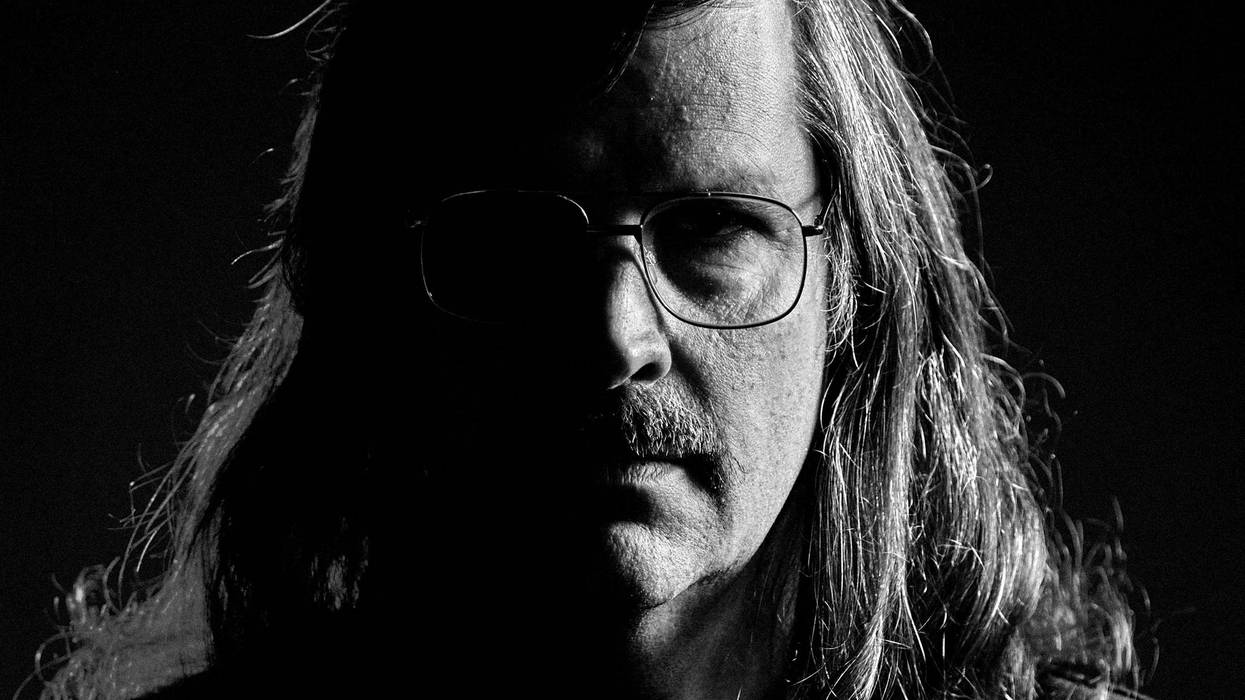



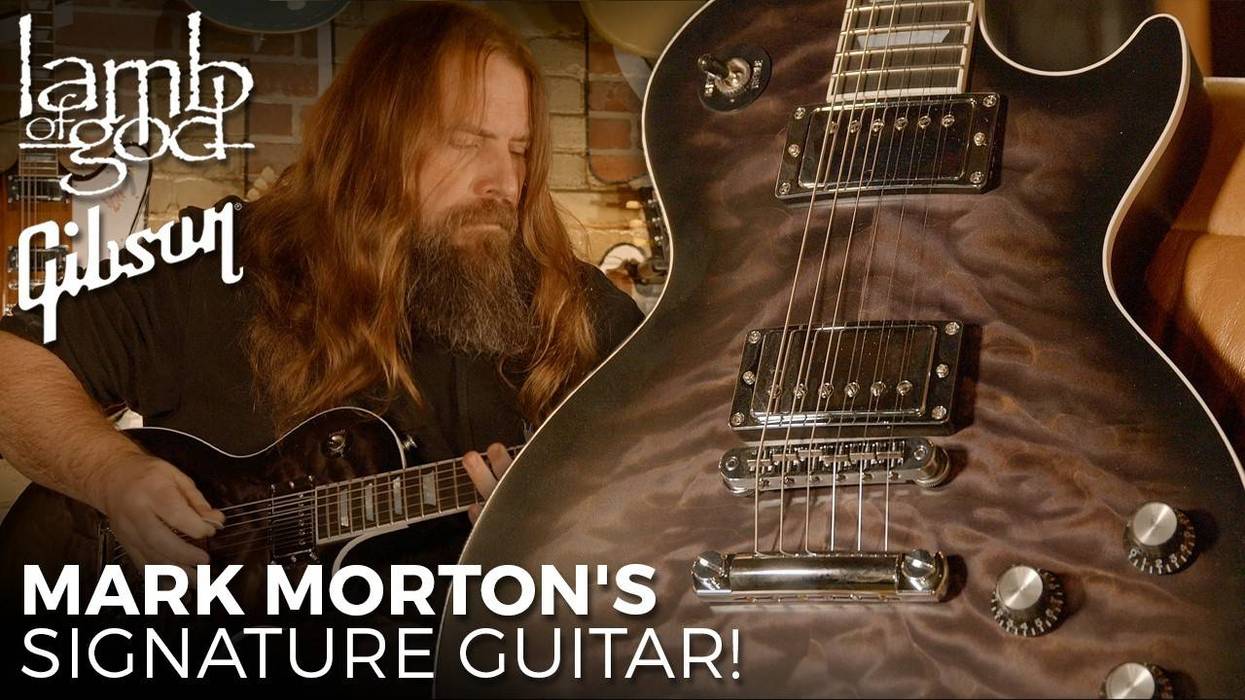

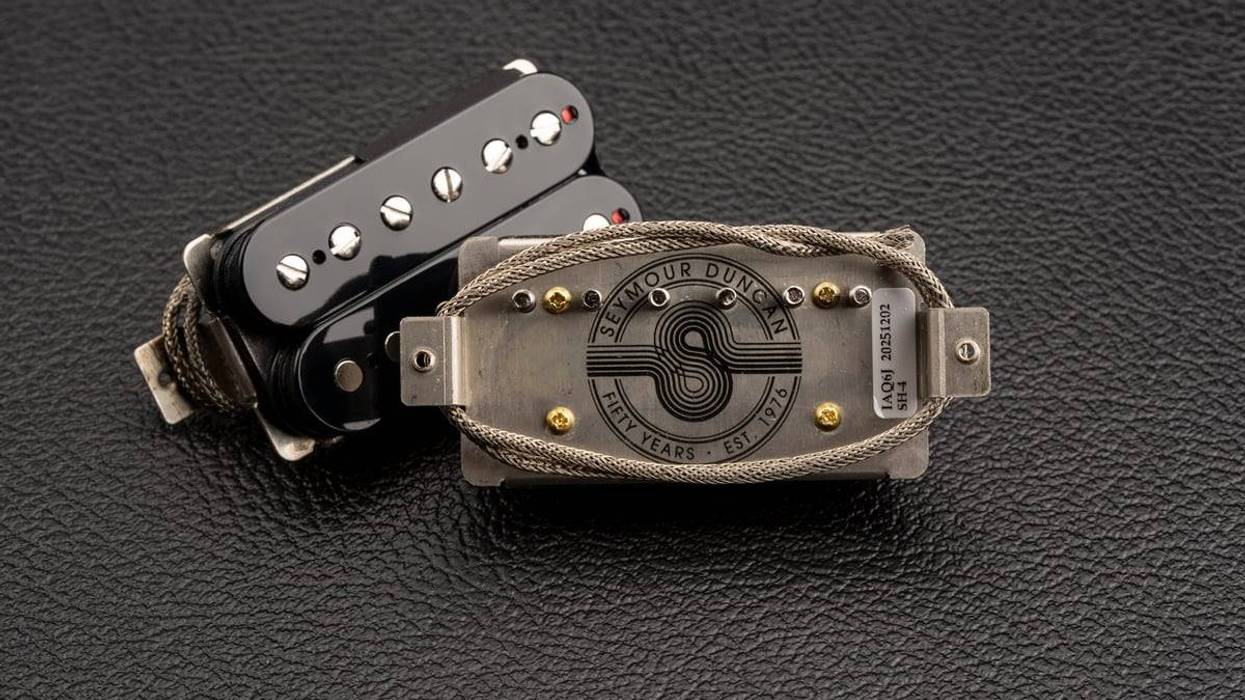



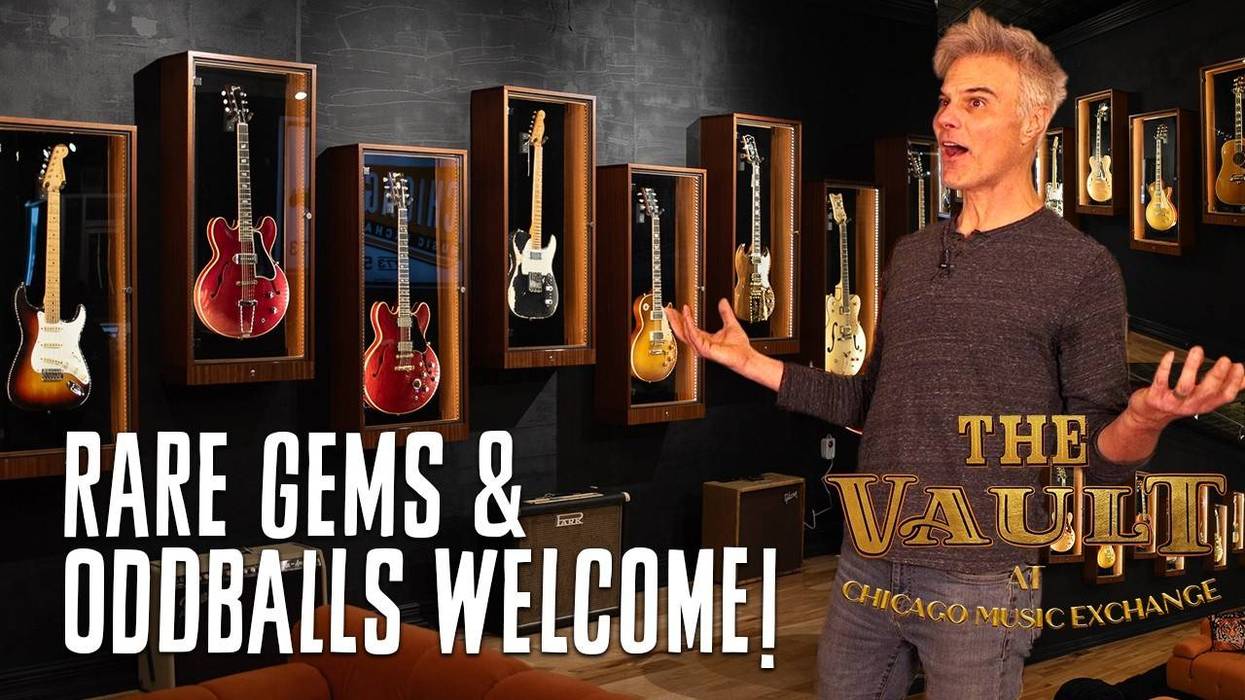
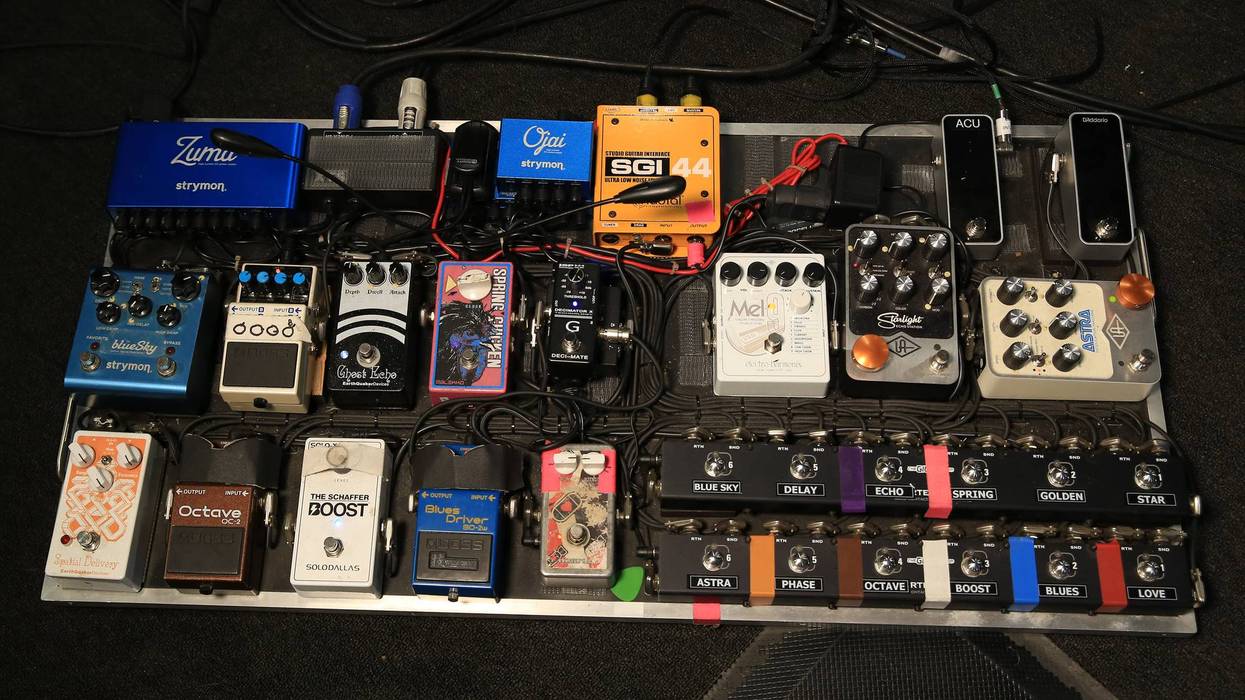
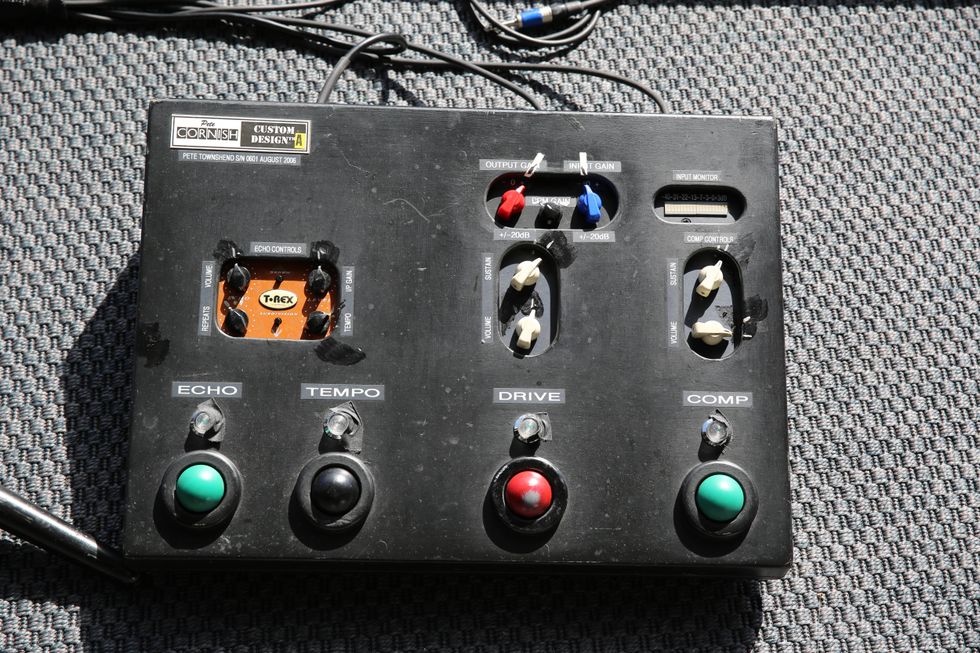
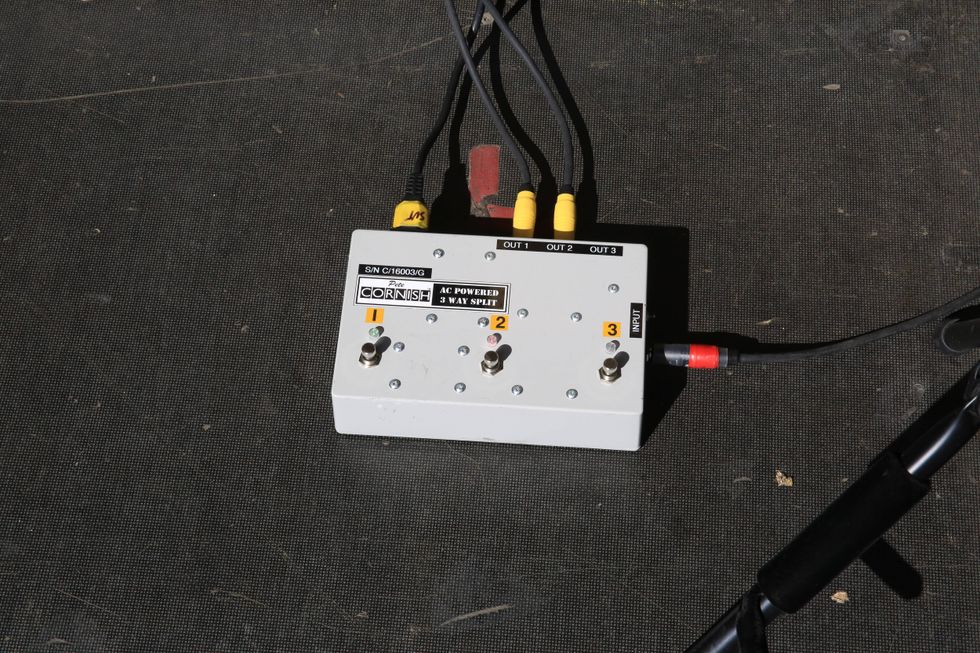
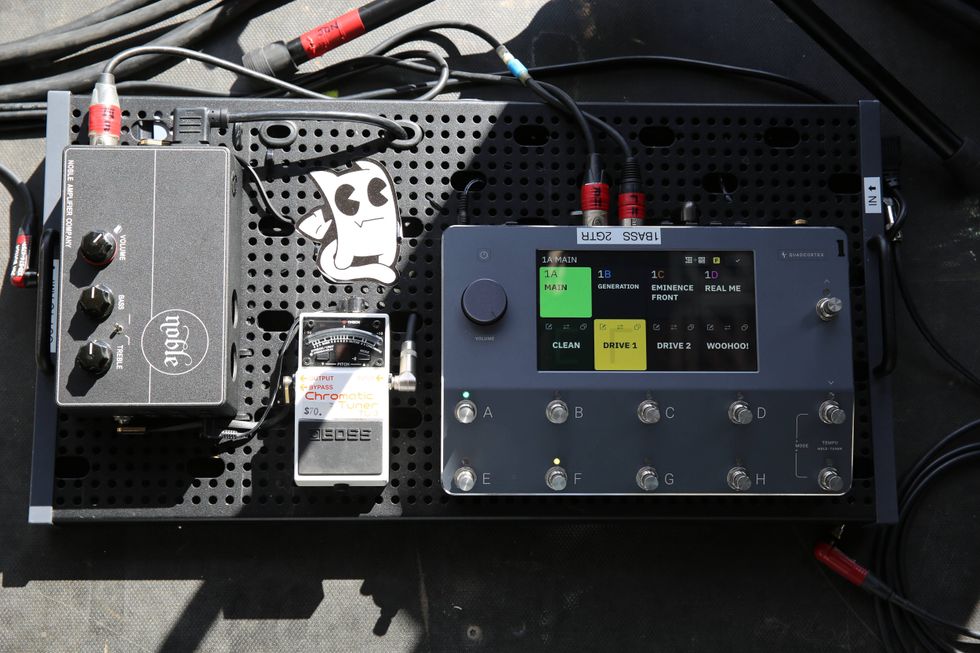
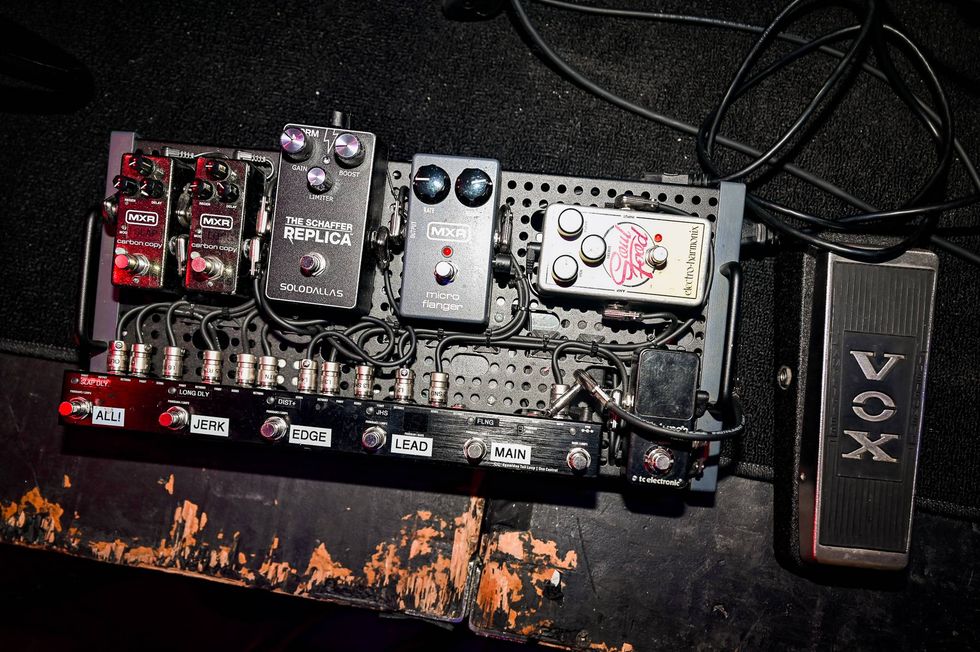
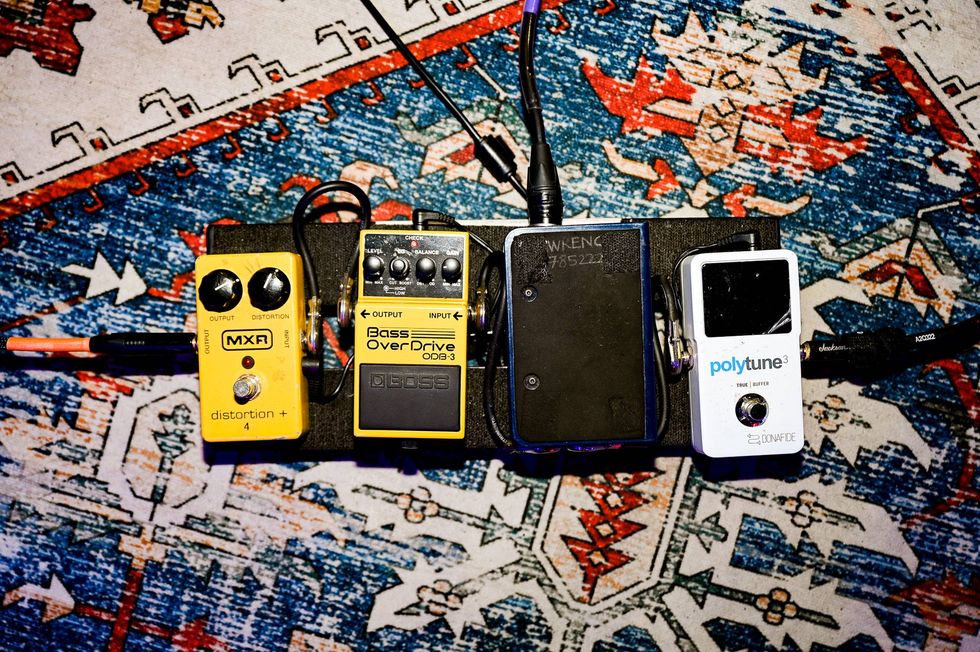
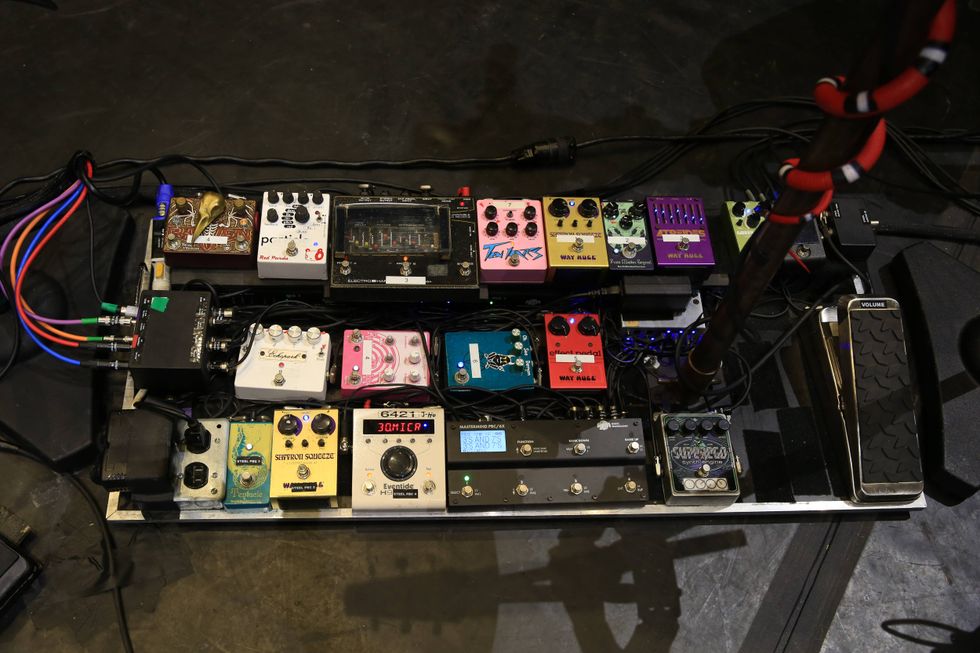
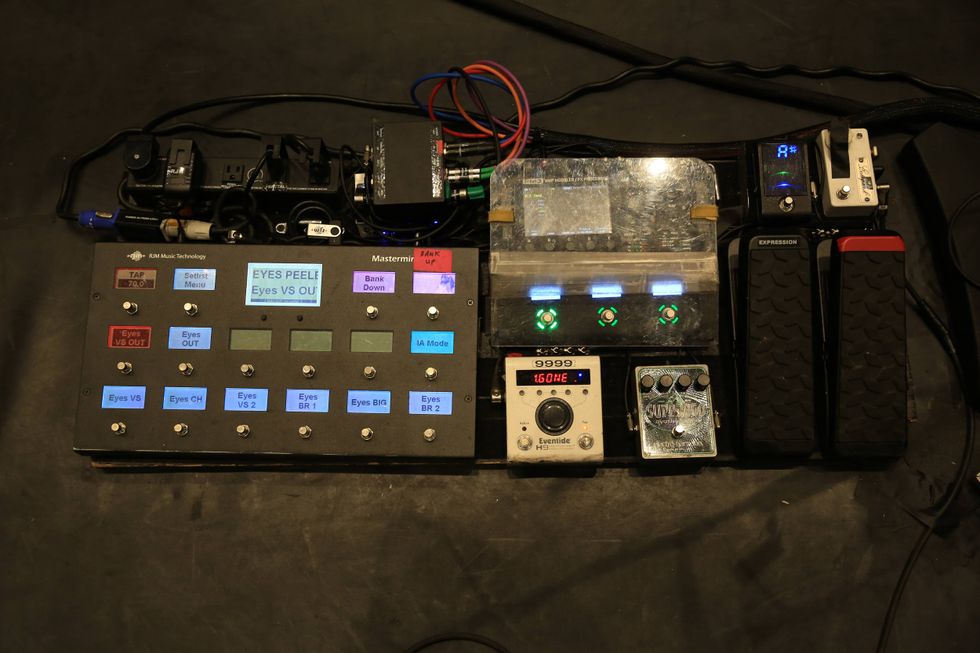
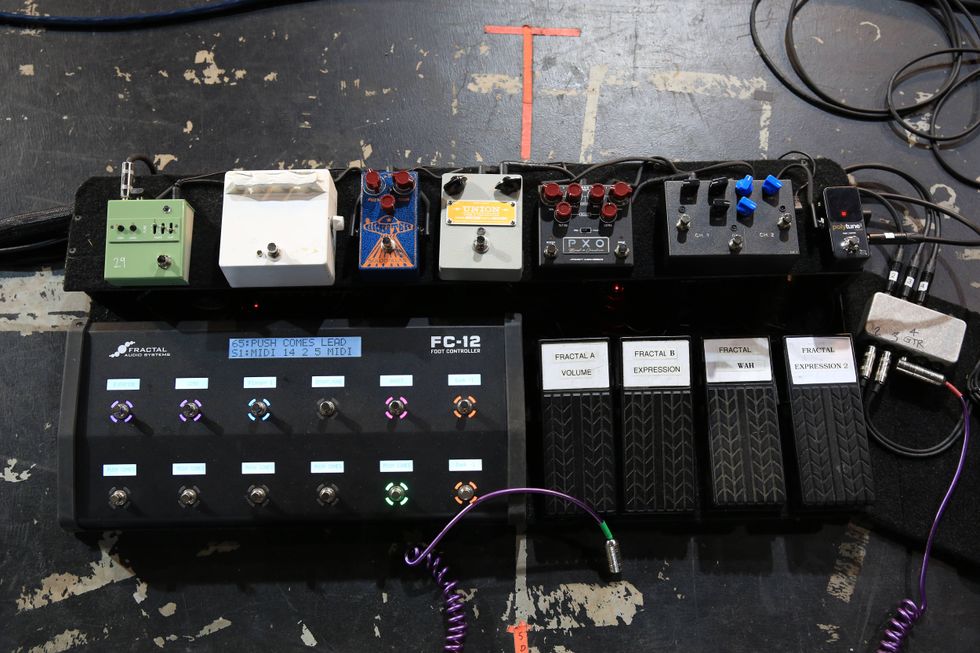
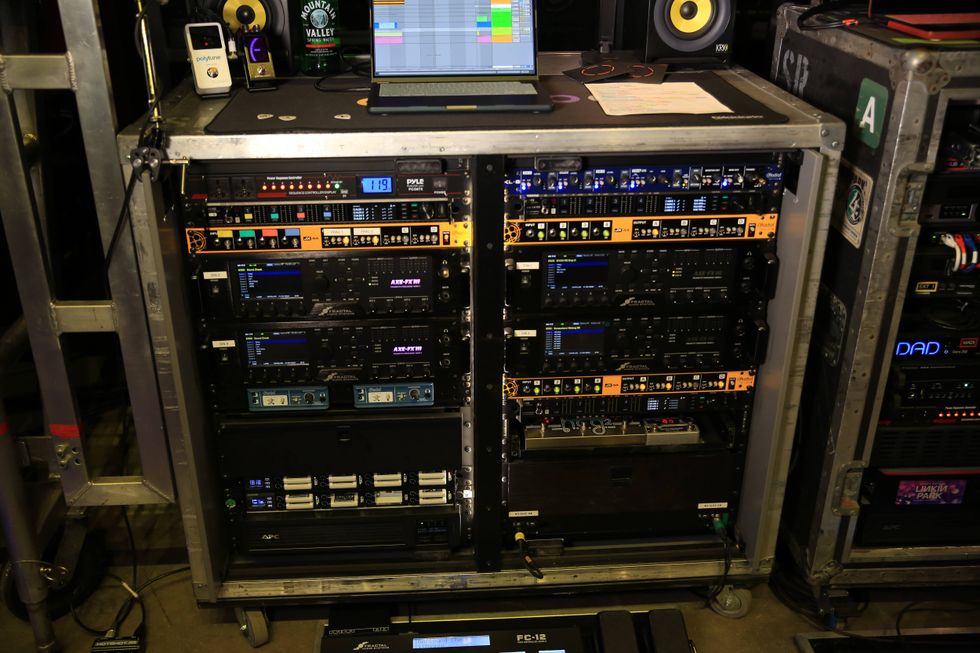
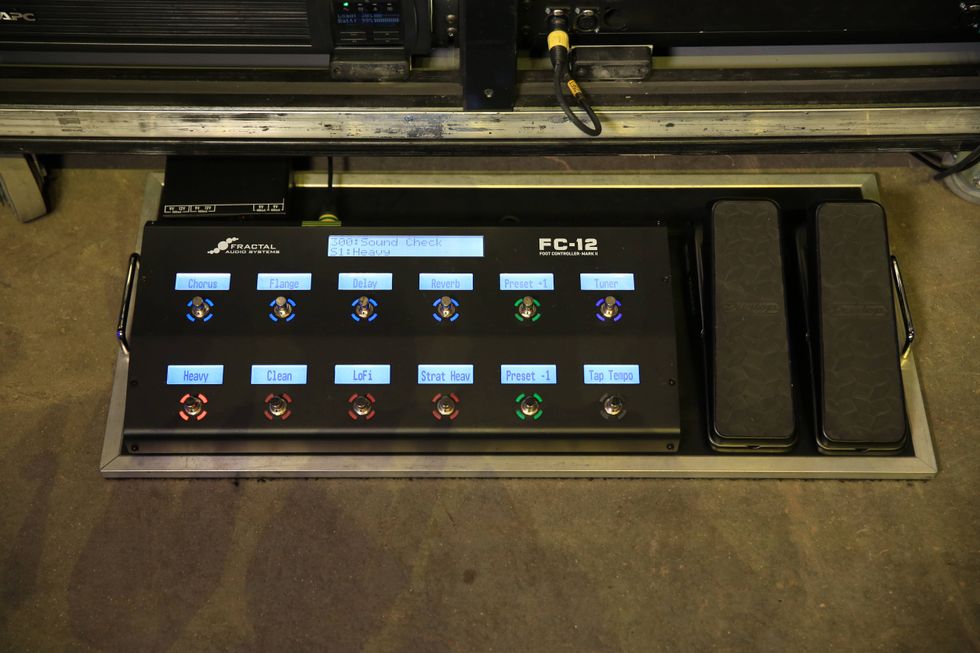
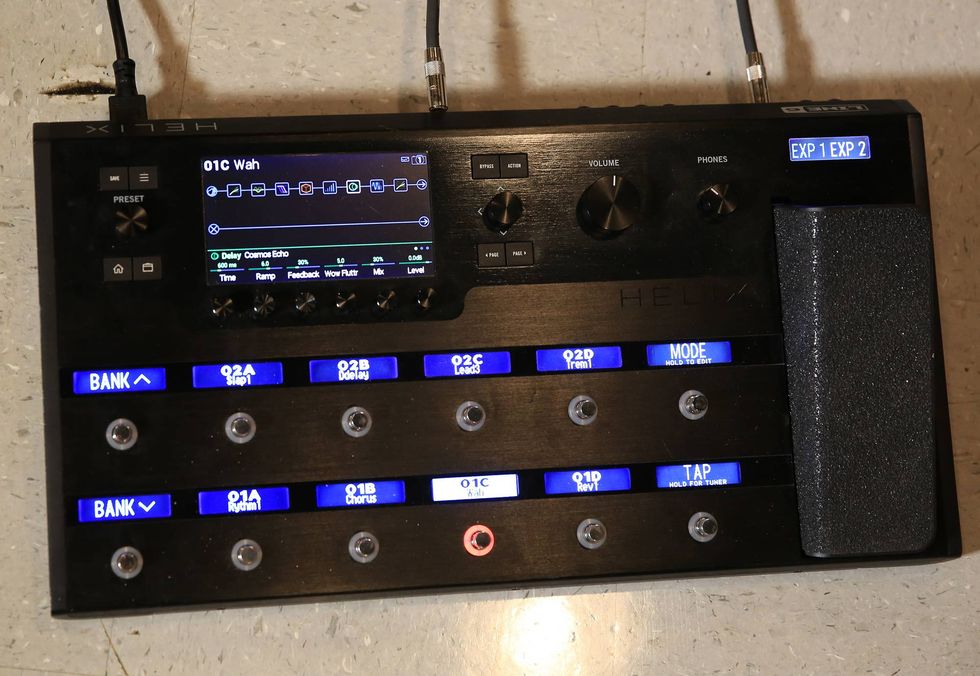
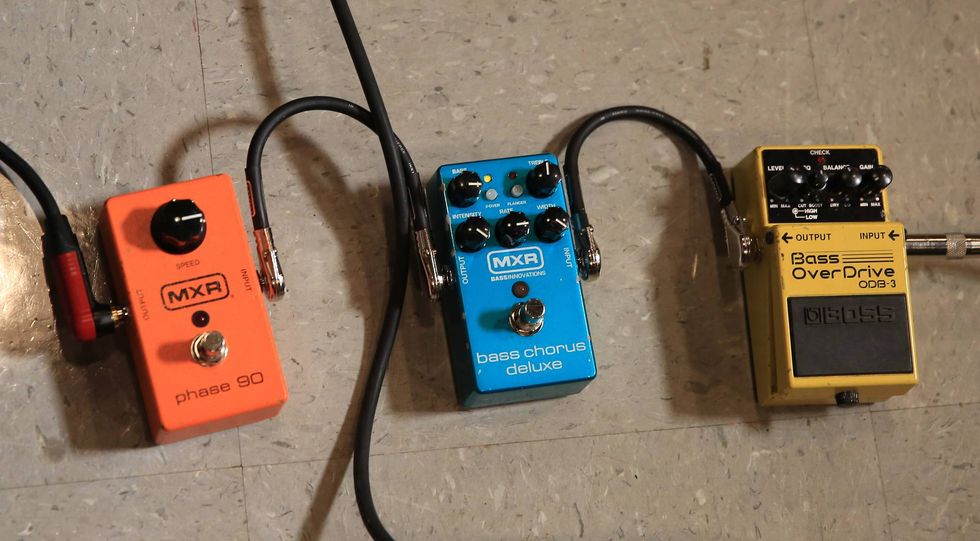
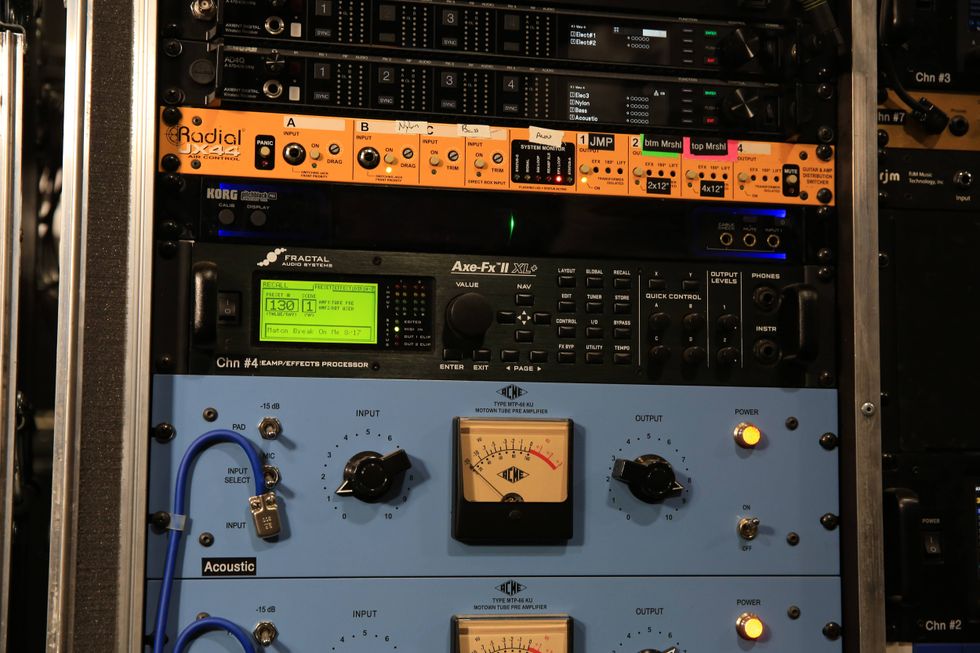
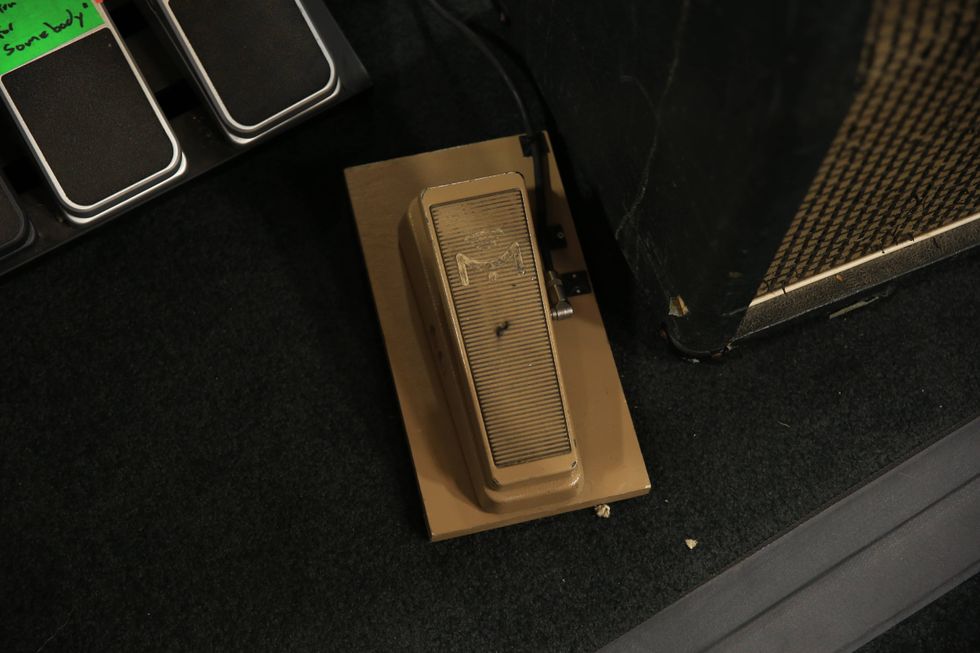
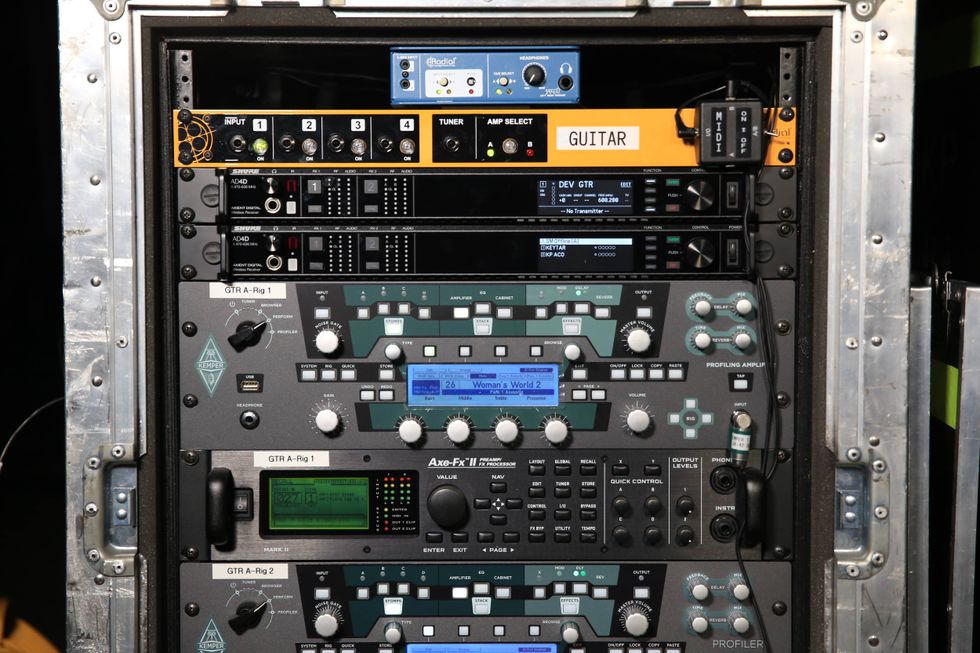
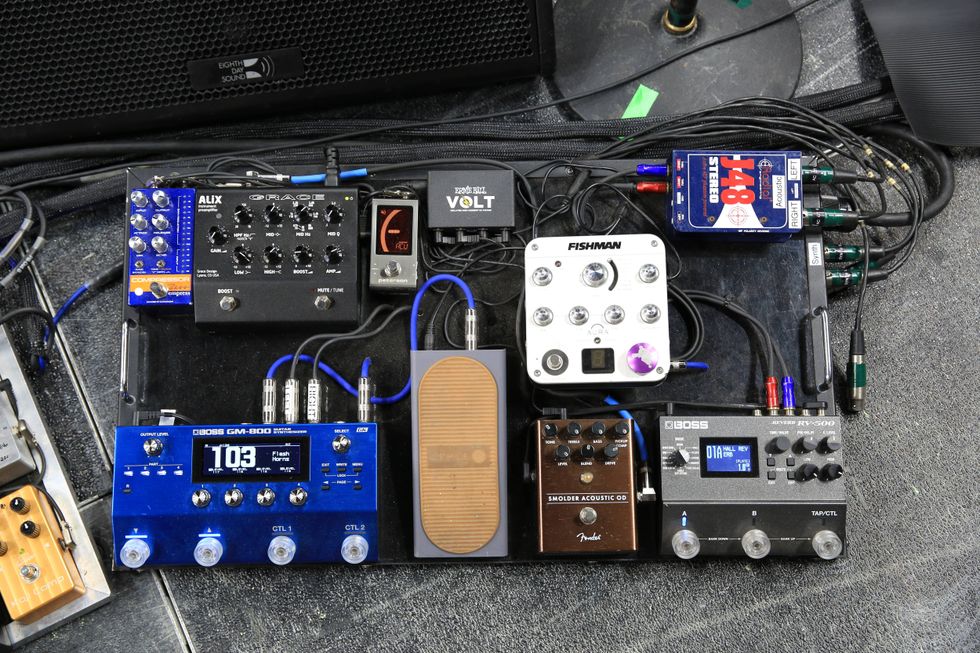
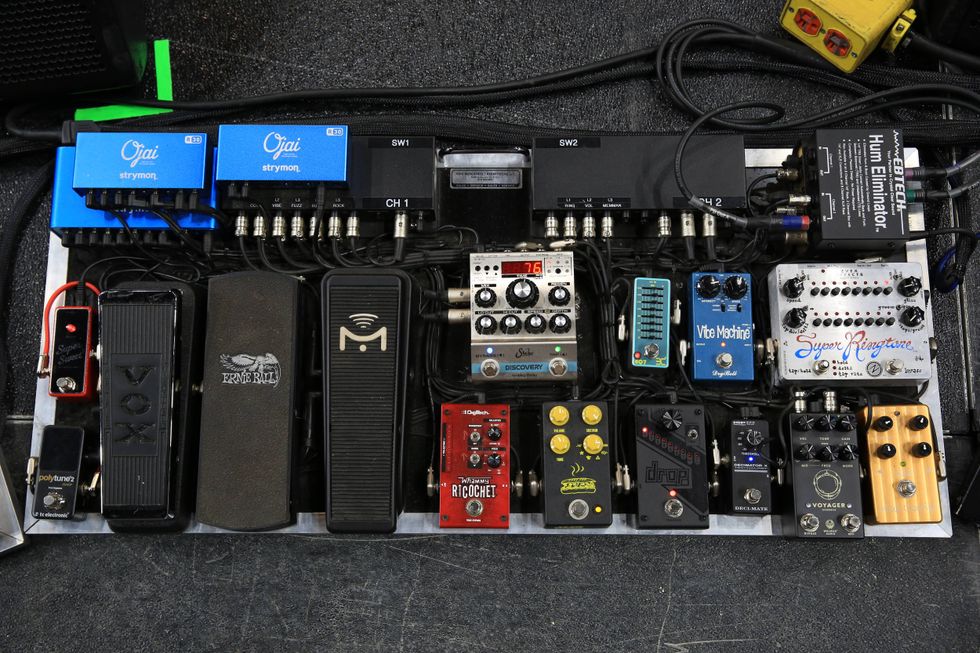
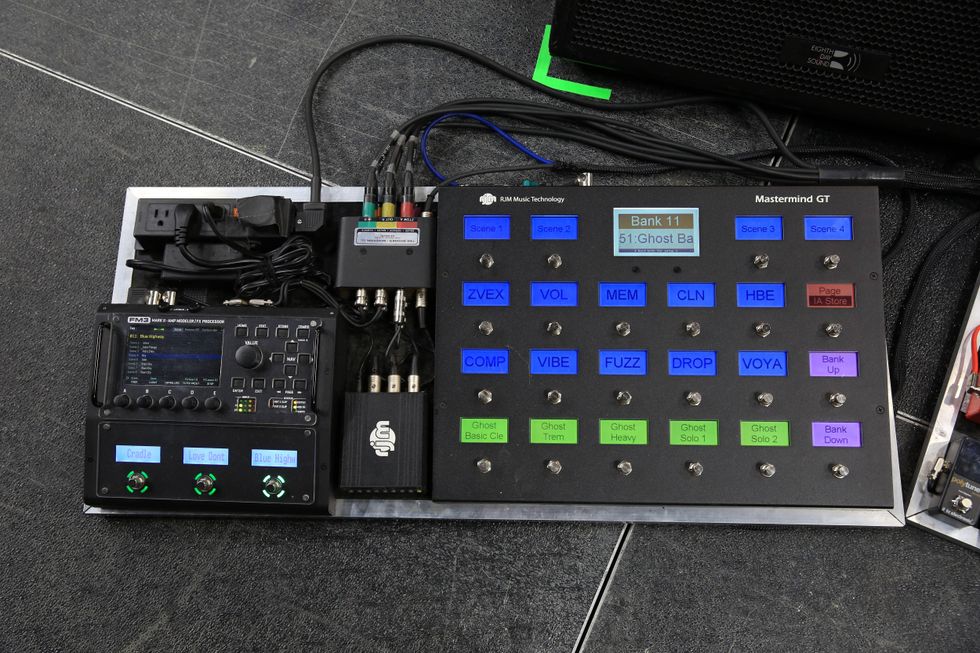
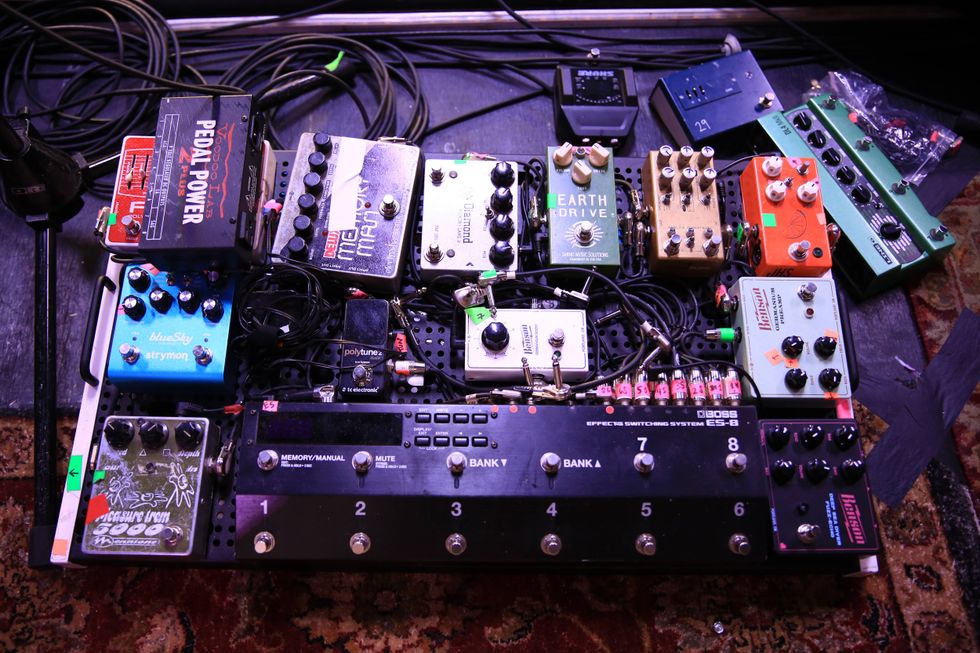
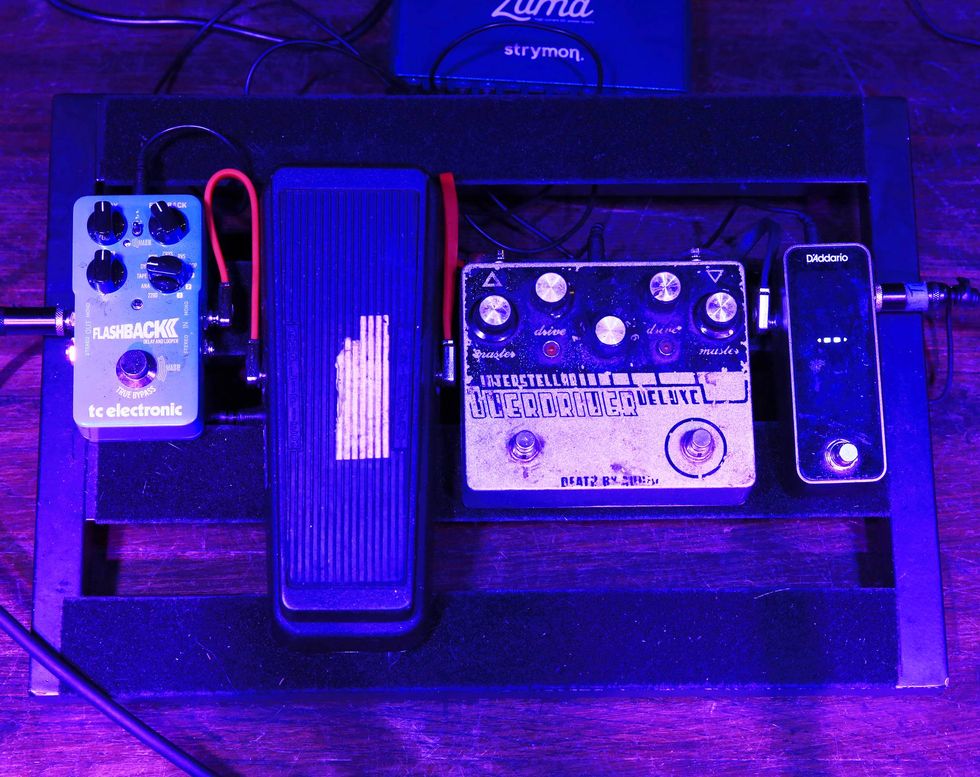
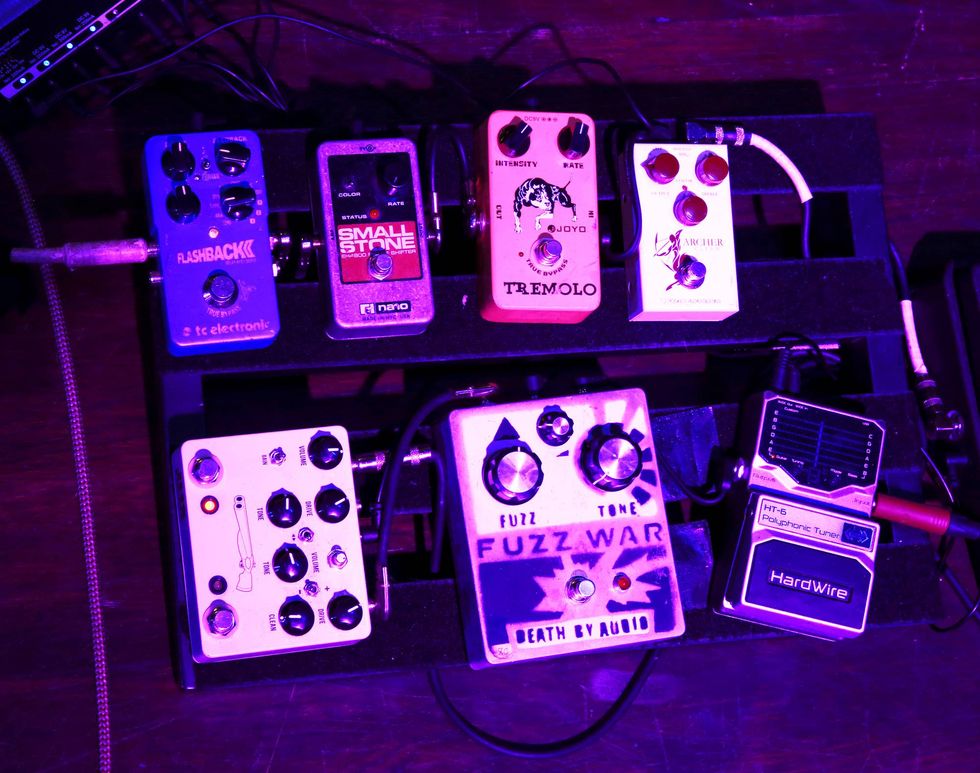
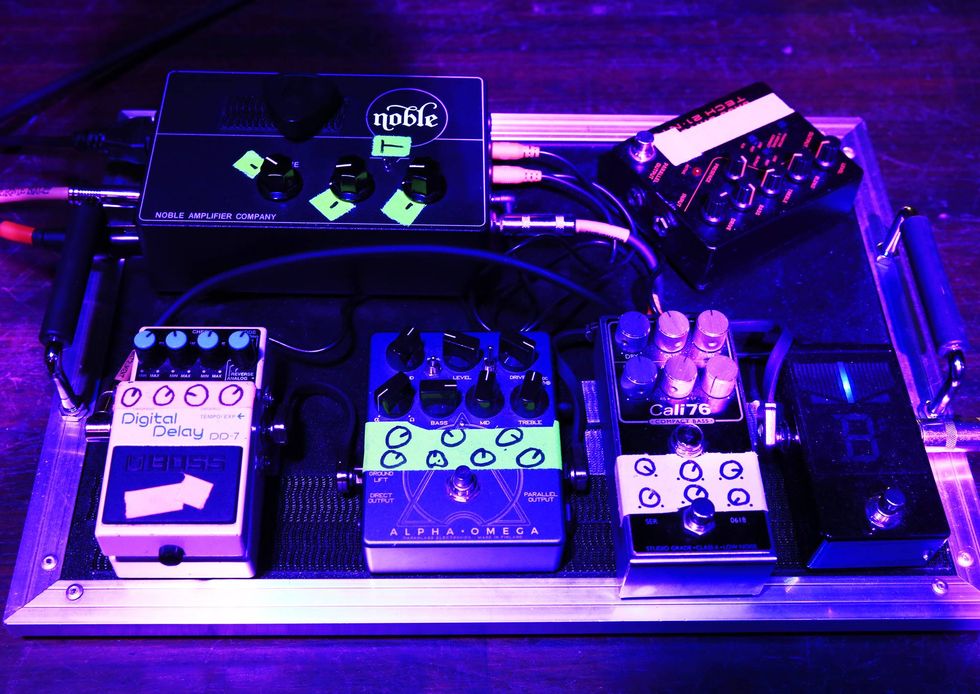
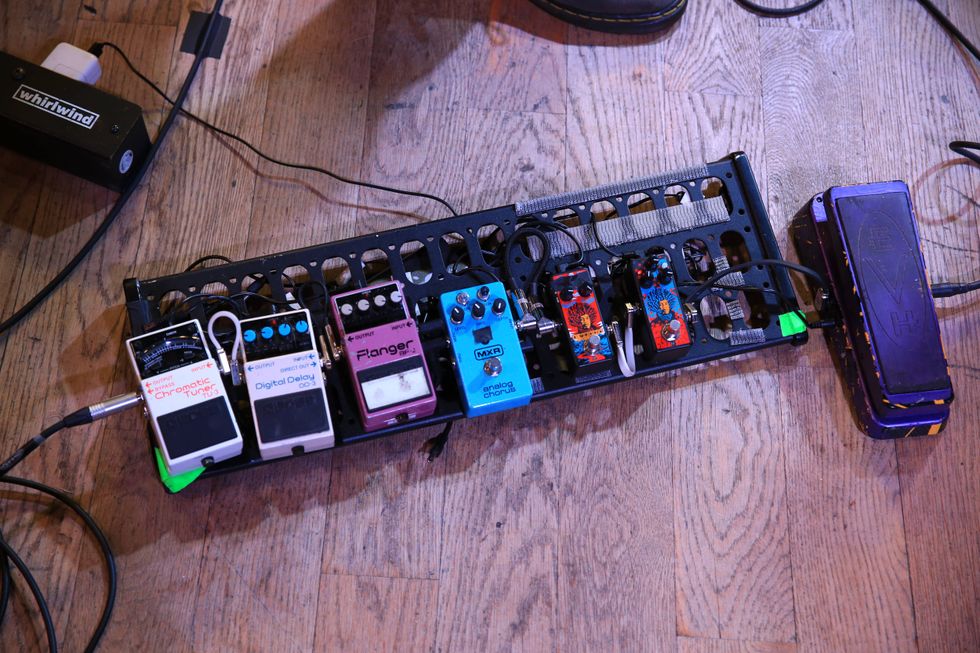
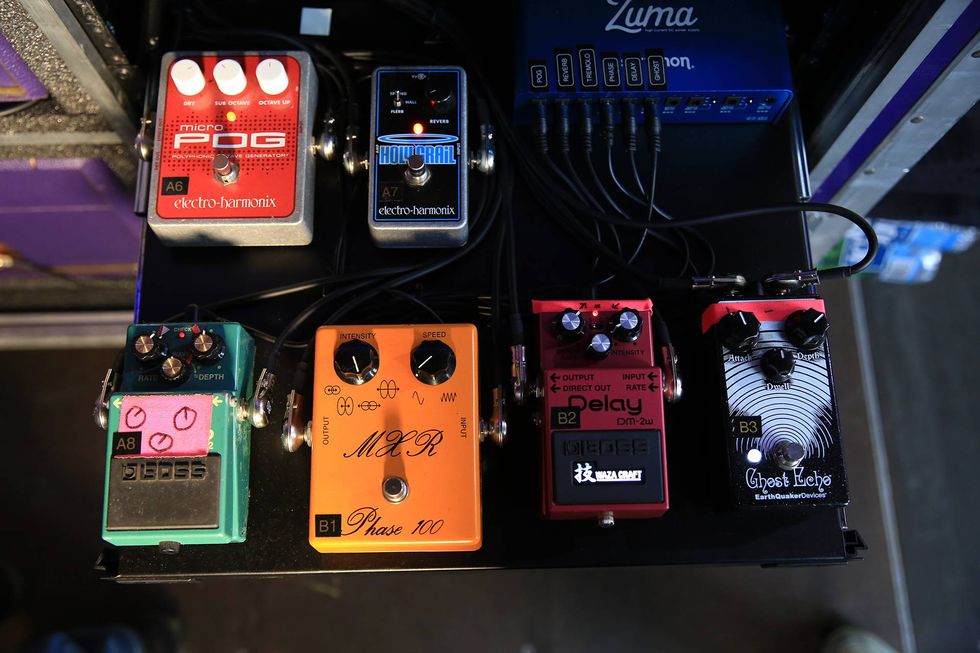
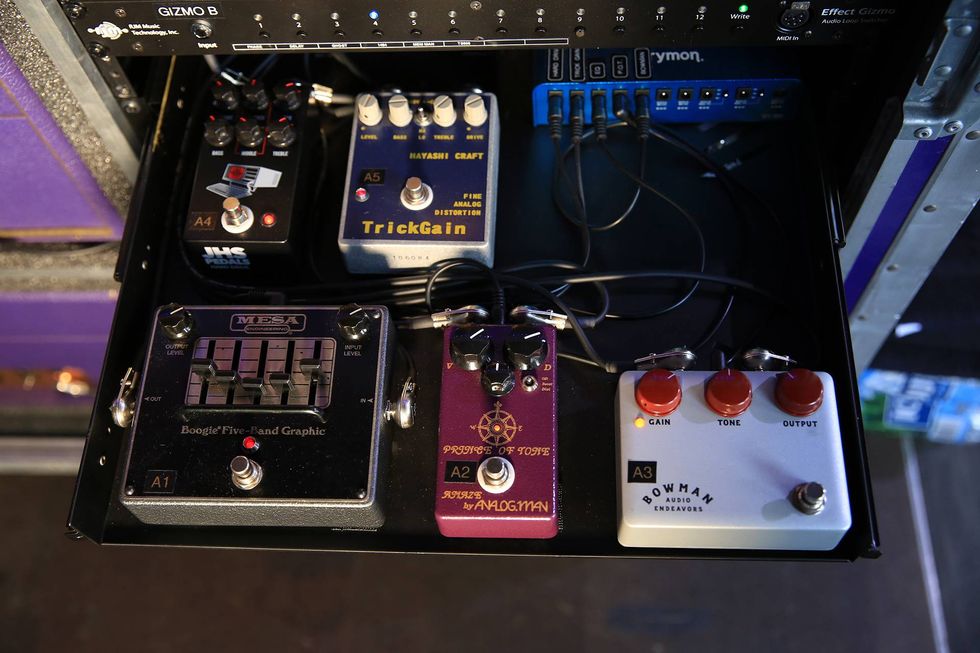
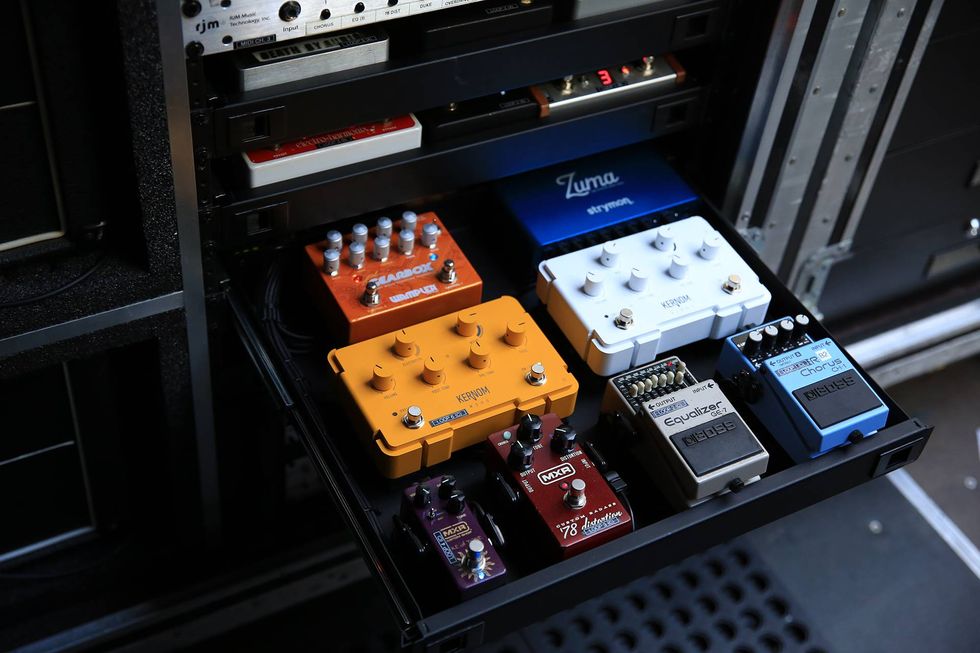
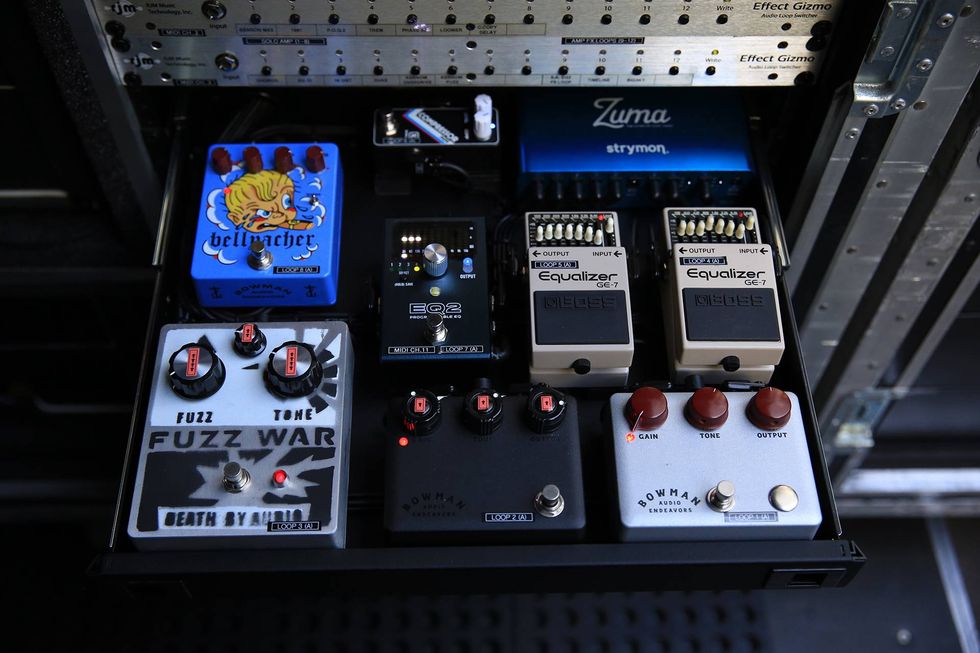
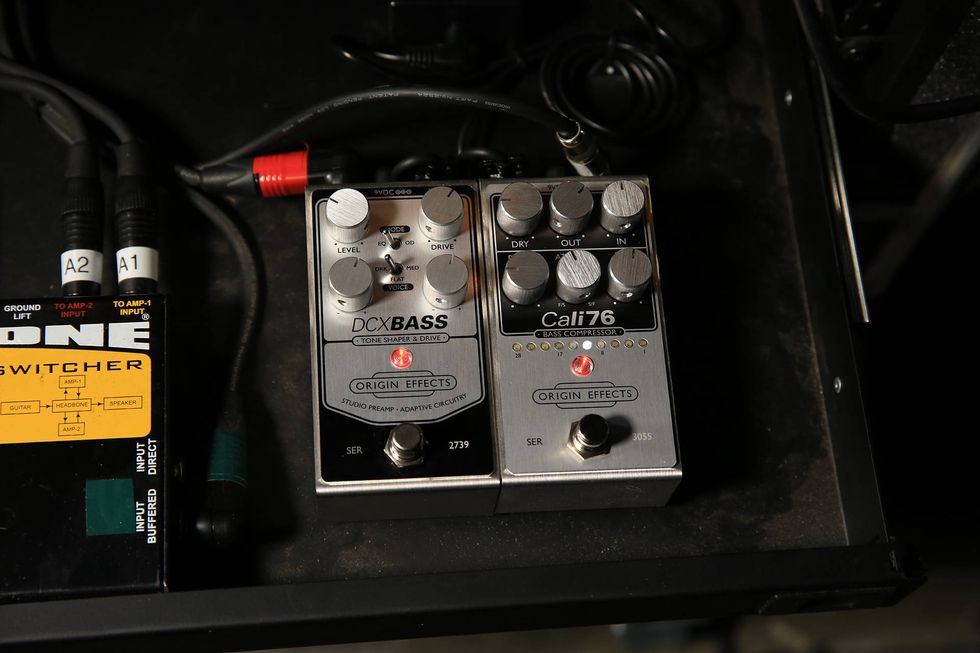
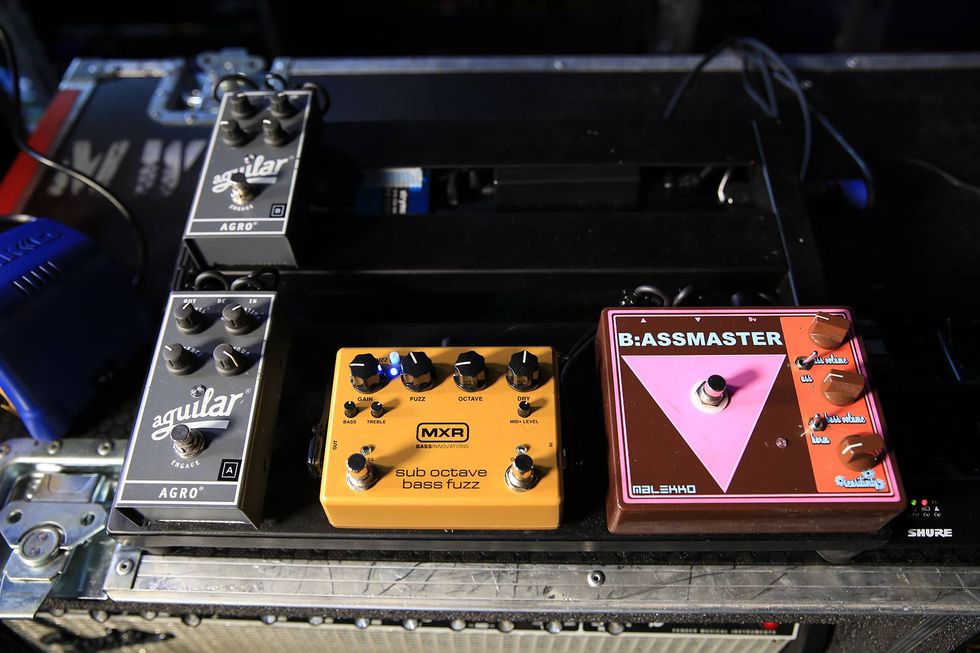
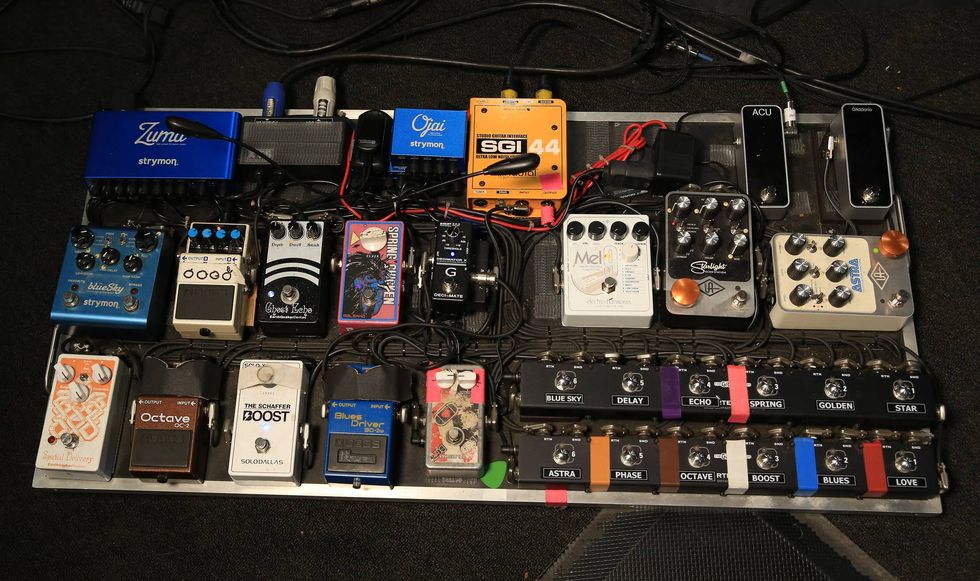
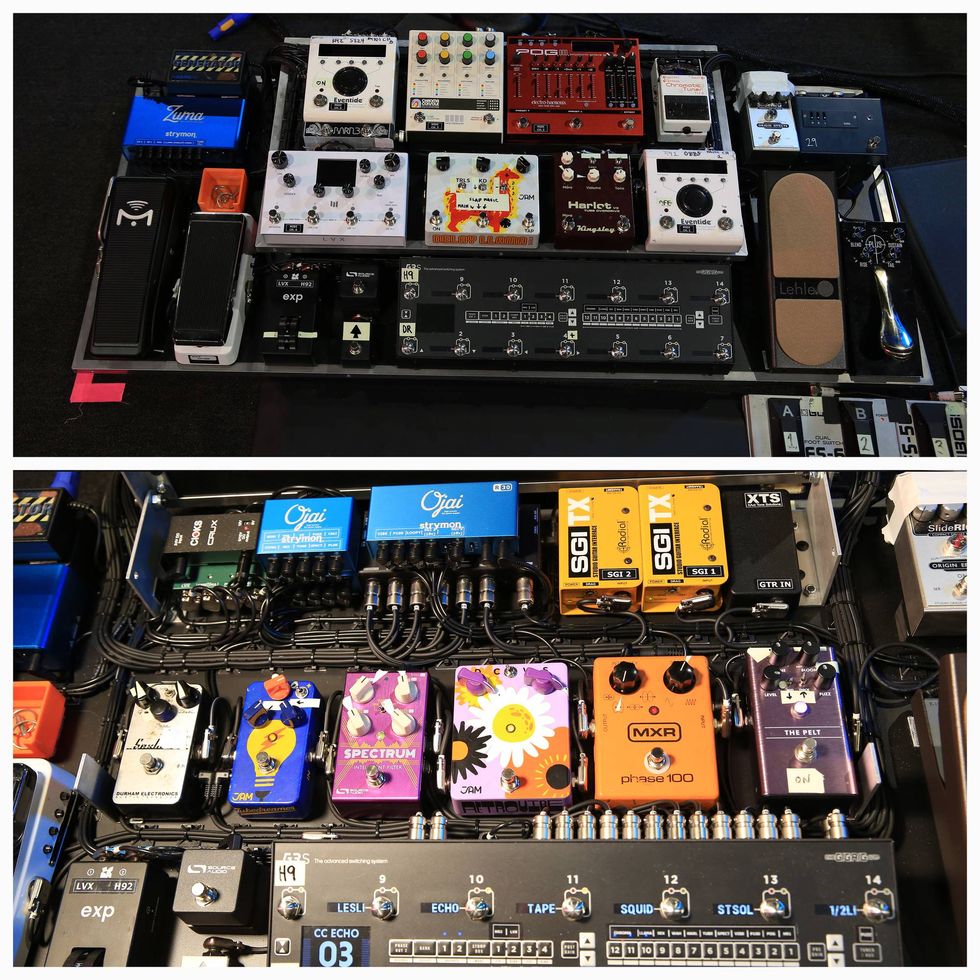
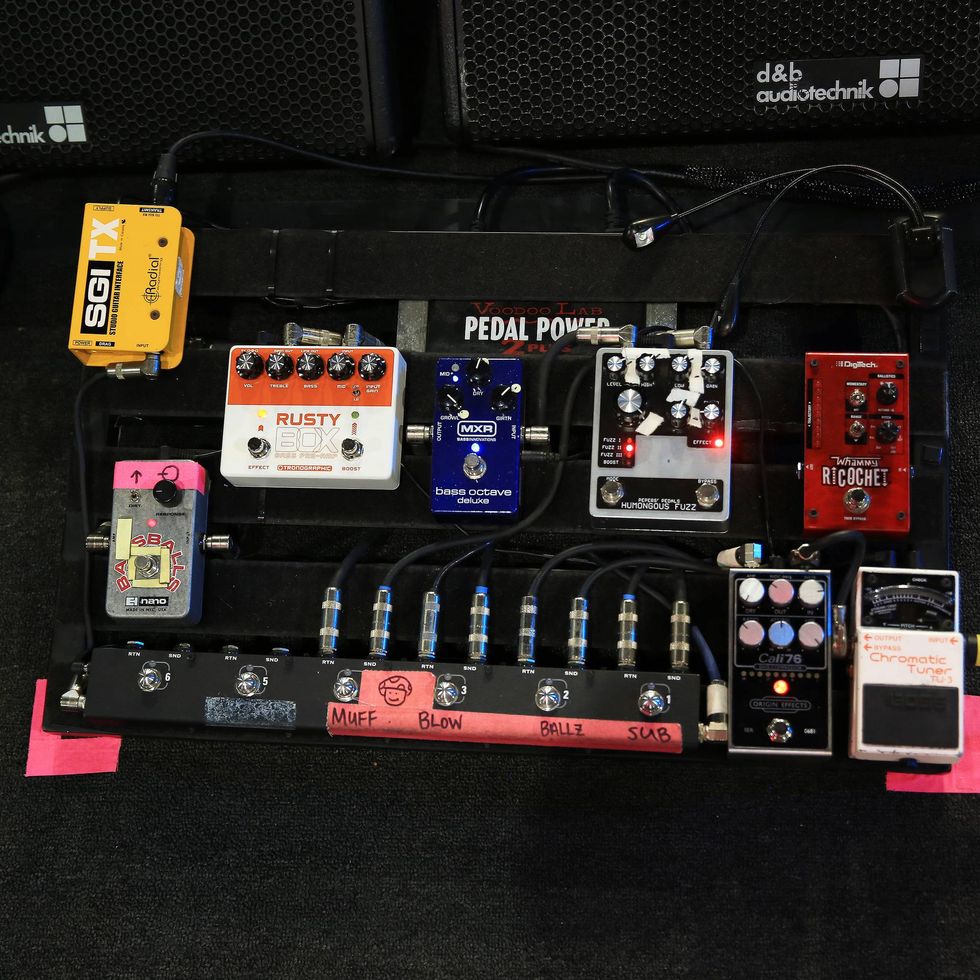




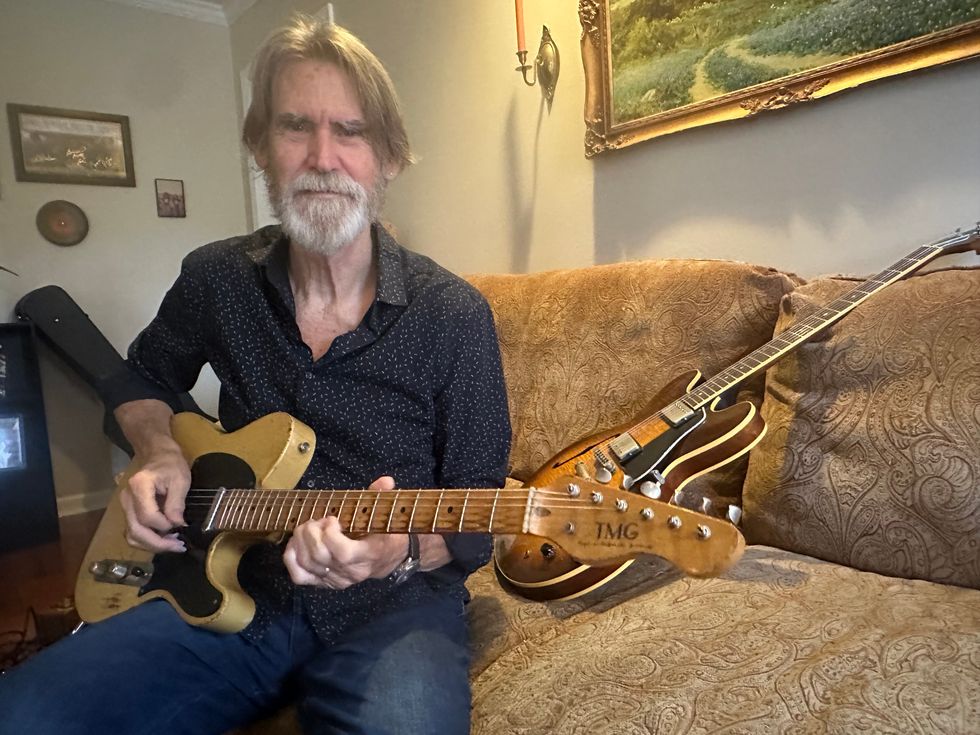 Will McFarlane keeps a Deluxe Memory Man in line with a Princeton—his rig for noodling on the couch at home.Ted Drozdowski
Will McFarlane keeps a Deluxe Memory Man in line with a Princeton—his rig for noodling on the couch at home.Ted Drozdowski